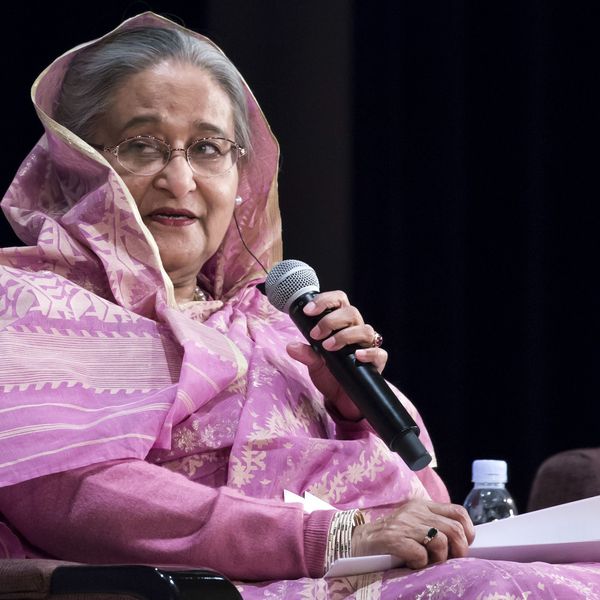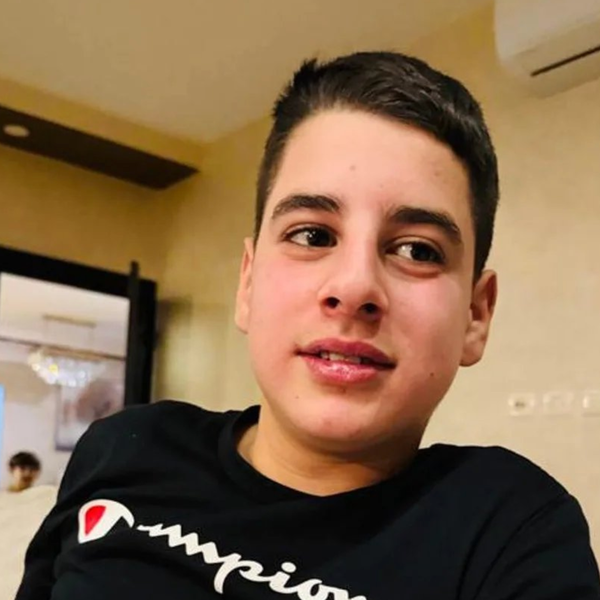Mohamed Morsi, Egypt's First Freely Elected President, Sentenced to Death
'The death penalty has become the favorite tool for the Egyptian authorities to purge the political opposition,' says Amnesty International
An Egyptian court on Saturday sentenced ousted president Mohamed Morsi and more than 100 other defendants to death for their role in a 2011 mass prison break.
Morsi, Egypt's first democratically elected president, was ousted by the military in July 2013 after days of street protests by Egyptians demanding that he be removed because of his divisive rule. His overthrow triggered a government crackdown on his Muslim Brotherhood movement in which hundreds of people have died and thousands have been imprisoned.
Last month, Morsi, along with 14 other defendants, was sentenced to 20 years in maximum security prison and five years of parole over the killing of demonstrators outside his palace in 2012.
Al Jazeera reports that many of those sentenced on Saturday were tried in absentia, including Yusuf al-Qaradawi, an influential Islamic scholar based in Qatar.
According to the Associated Press, "Supporters of Morsi and his now-outlawed Muslim Brotherhood chanted 'down, down with military rule' as the verdict was announced in the courtroom, a converted lecture hall in the national police academy in an eastern Cairo suburb."
All along, rights groups including Amnesty International have criticized the trials as being "grossly unfair" and indicative of "the deplorable state of the country's criminal justice system."
Following Saturday's announcement, Said Boumedouha, deputy director of Amnesty International's Middle East and North Africa Program, declared: "Condemning Mohamed Morsi to death after more grossly unfair trials shows a complete disregard for human rights. His trials were undermined even before he set foot in the courtroom. The fact that he was held for months incommunicado without judicial oversight and that he didn't have a lawyer to represent him during the investigations makes these trials nothing but a charade based on null and void procedures."
Boumedouha added: "The death penalty has become the favourite tool for the Egyptian authorities to purge the political opposition. Most of those sentenced to death by courts since July 2013 have been Morsi supporters. The deal seems to be: Support Morsi and get sentenced to death or to years behind bars. Instead, Egypt must ensure the independence and impartiality of the justice system and bring to justice all those responsible for gross human rights violations."
Calling on the international community to step in and stop the execution, Amr Darrag, co-founder of the dissolved Freedom and Justice Party, the political wing of the Brotherhood, told Reuters in Istanbul: "This is a political verdict and represents a murder crime that is about to be committed."
As per Egyptian law, the case now goes to the country's top Muslim theologian, or mufti, for his non-binding opinion--a mandatory procedure before a criminal court can formally hand down the death sentence. If Morsi and the other defendants are sentenced to death when the court hands down its final verdict on June 2, they will be able to appeal their death sentences before Egypt's highest court, the Court of Cassation.
An Urgent Message From Our Co-Founder
Dear Common Dreams reader, The U.S. is on a fast track to authoritarianism like nothing I've ever seen. Meanwhile, corporate news outlets are utterly capitulating to Trump, twisting their coverage to avoid drawing his ire while lining up to stuff cash in his pockets. That's why I believe that Common Dreams is doing the best and most consequential reporting that we've ever done. Our small but mighty team is a progressive reporting powerhouse, covering the news every day that the corporate media never will. Our mission has always been simple: To inform. To inspire. And to ignite change for the common good. Now here's the key piece that I want all our readers to understand: None of this would be possible without your financial support. That's not just some fundraising cliche. It's the absolute and literal truth. We don't accept corporate advertising and never will. We don't have a paywall because we don't think people should be blocked from critical news based on their ability to pay. Everything we do is funded by the donations of readers like you. Will you donate now to help power the nonprofit, independent reporting of Common Dreams? Thank you for being a vital member of our community. Together, we can keep independent journalism alive when it’s needed most. - Craig Brown, Co-founder |
An Egyptian court on Saturday sentenced ousted president Mohamed Morsi and more than 100 other defendants to death for their role in a 2011 mass prison break.
Morsi, Egypt's first democratically elected president, was ousted by the military in July 2013 after days of street protests by Egyptians demanding that he be removed because of his divisive rule. His overthrow triggered a government crackdown on his Muslim Brotherhood movement in which hundreds of people have died and thousands have been imprisoned.
Last month, Morsi, along with 14 other defendants, was sentenced to 20 years in maximum security prison and five years of parole over the killing of demonstrators outside his palace in 2012.
Al Jazeera reports that many of those sentenced on Saturday were tried in absentia, including Yusuf al-Qaradawi, an influential Islamic scholar based in Qatar.
According to the Associated Press, "Supporters of Morsi and his now-outlawed Muslim Brotherhood chanted 'down, down with military rule' as the verdict was announced in the courtroom, a converted lecture hall in the national police academy in an eastern Cairo suburb."
All along, rights groups including Amnesty International have criticized the trials as being "grossly unfair" and indicative of "the deplorable state of the country's criminal justice system."
Following Saturday's announcement, Said Boumedouha, deputy director of Amnesty International's Middle East and North Africa Program, declared: "Condemning Mohamed Morsi to death after more grossly unfair trials shows a complete disregard for human rights. His trials were undermined even before he set foot in the courtroom. The fact that he was held for months incommunicado without judicial oversight and that he didn't have a lawyer to represent him during the investigations makes these trials nothing but a charade based on null and void procedures."
Boumedouha added: "The death penalty has become the favourite tool for the Egyptian authorities to purge the political opposition. Most of those sentenced to death by courts since July 2013 have been Morsi supporters. The deal seems to be: Support Morsi and get sentenced to death or to years behind bars. Instead, Egypt must ensure the independence and impartiality of the justice system and bring to justice all those responsible for gross human rights violations."
Calling on the international community to step in and stop the execution, Amr Darrag, co-founder of the dissolved Freedom and Justice Party, the political wing of the Brotherhood, told Reuters in Istanbul: "This is a political verdict and represents a murder crime that is about to be committed."
As per Egyptian law, the case now goes to the country's top Muslim theologian, or mufti, for his non-binding opinion--a mandatory procedure before a criminal court can formally hand down the death sentence. If Morsi and the other defendants are sentenced to death when the court hands down its final verdict on June 2, they will be able to appeal their death sentences before Egypt's highest court, the Court of Cassation.
An Egyptian court on Saturday sentenced ousted president Mohamed Morsi and more than 100 other defendants to death for their role in a 2011 mass prison break.
Morsi, Egypt's first democratically elected president, was ousted by the military in July 2013 after days of street protests by Egyptians demanding that he be removed because of his divisive rule. His overthrow triggered a government crackdown on his Muslim Brotherhood movement in which hundreds of people have died and thousands have been imprisoned.
Last month, Morsi, along with 14 other defendants, was sentenced to 20 years in maximum security prison and five years of parole over the killing of demonstrators outside his palace in 2012.
Al Jazeera reports that many of those sentenced on Saturday were tried in absentia, including Yusuf al-Qaradawi, an influential Islamic scholar based in Qatar.
According to the Associated Press, "Supporters of Morsi and his now-outlawed Muslim Brotherhood chanted 'down, down with military rule' as the verdict was announced in the courtroom, a converted lecture hall in the national police academy in an eastern Cairo suburb."
All along, rights groups including Amnesty International have criticized the trials as being "grossly unfair" and indicative of "the deplorable state of the country's criminal justice system."
Following Saturday's announcement, Said Boumedouha, deputy director of Amnesty International's Middle East and North Africa Program, declared: "Condemning Mohamed Morsi to death after more grossly unfair trials shows a complete disregard for human rights. His trials were undermined even before he set foot in the courtroom. The fact that he was held for months incommunicado without judicial oversight and that he didn't have a lawyer to represent him during the investigations makes these trials nothing but a charade based on null and void procedures."
Boumedouha added: "The death penalty has become the favourite tool for the Egyptian authorities to purge the political opposition. Most of those sentenced to death by courts since July 2013 have been Morsi supporters. The deal seems to be: Support Morsi and get sentenced to death or to years behind bars. Instead, Egypt must ensure the independence and impartiality of the justice system and bring to justice all those responsible for gross human rights violations."
Calling on the international community to step in and stop the execution, Amr Darrag, co-founder of the dissolved Freedom and Justice Party, the political wing of the Brotherhood, told Reuters in Istanbul: "This is a political verdict and represents a murder crime that is about to be committed."
As per Egyptian law, the case now goes to the country's top Muslim theologian, or mufti, for his non-binding opinion--a mandatory procedure before a criminal court can formally hand down the death sentence. If Morsi and the other defendants are sentenced to death when the court hands down its final verdict on June 2, they will be able to appeal their death sentences before Egypt's highest court, the Court of Cassation.

